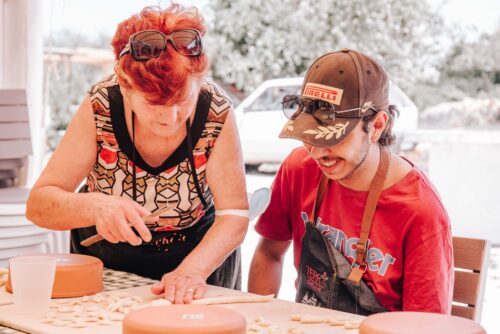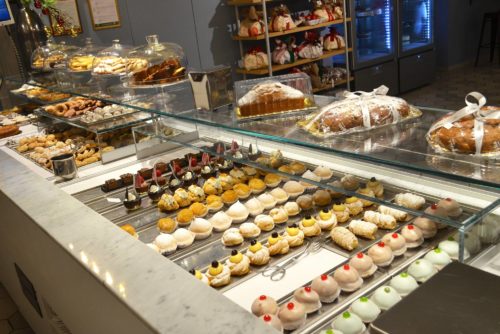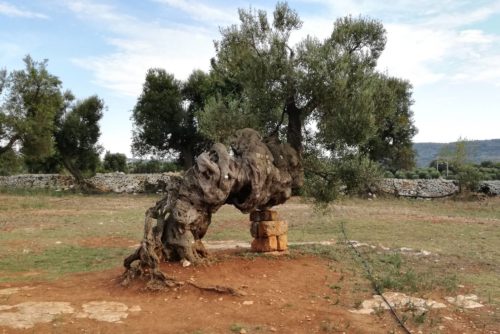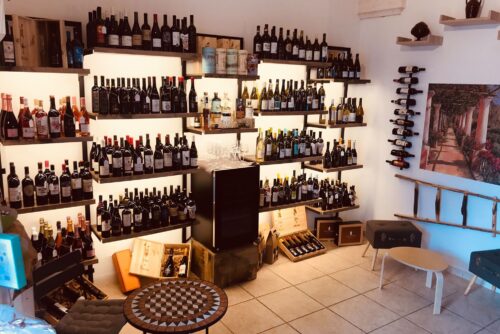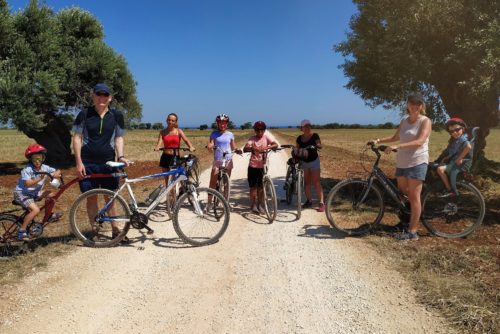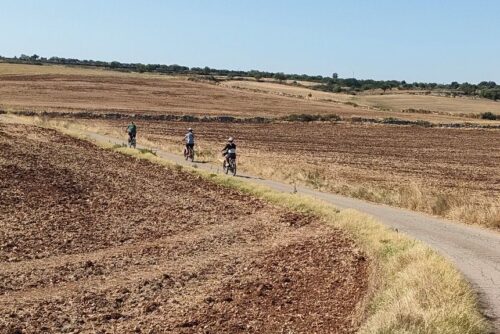Topics
Discover and taste Apulian cheeses and fresh dairy products in a cheese factory
What is the most authentic experience you can have during your holiday in Puglia? Definitely a tasting of cheese, mozzarella and burrata!
Thanks to Terrachevive.com, a website dedicated to promoting food and wine activities, you can visit the places where Apulian dairy products are produced. You will see with your own eyes the master cheesemakers engaged in the production of fresh cheeses and dairy products, you will be welcomed into a real cheese factory, and taste freshly made cheese, mozzarella and burrata.
Don’t miss the chance to enjoy an unforgettable experience with local experts. We will share our ancient farming traditions with you. We will tell you the story of our world-famous and appreciated dairy products.
And finally, you can enjoy a rich tasting of typical Apulian products!

The Apulian art of cheese-making
The ancient art of cheese-making is widespread throughout Puglia with some differences in production methods and types of products. There are, in fact, many cheese factories that produce fresh dairy products and hard cheeses on a daily basis. These production units are located in urban areas, i.e. in the cities, or in the Apulian countryside, and most of them are farmhouses which combine cheese production with the breeding of milk cows.
The entire dairy production process is carried out in these fascinating places, starting with the breeding of the animals, followed by milking them and transforming the milk into local delicacies such as mozzarella, burrata and cheese.
The production of the majority of dairy products is still carried out by hand, thanks to the skilled hands of master cheesemakers.
Here, the product supply chain is very short and we like to show it to the many tourists who are passionate about food and wine. The entire production process takes place in the very same place without any raw materials being purchased from outside. This guarantees the quality of the ingredients used and therefore of the finished products that are eventually bought and eaten by consumers.
And that’s not all! These production areas represent the heritage of the ancient farming tradition, which made the most of everything that nature gave us, either spontaneously or with the help of man and animals. Natural raw materials were obtained from the earth, according to seasonality and productivity, without any chemical alterations. As the elderly farmers still say today: “we lived with what the land gave us” and “we made do with what we had”.
How Apulian mozzarella and burrata are produced
Mozzarella and the creamy burrata are the undisputed real stars of the Apulian dairy tradition. You must definitely try these fresh dairy products during your holiday in Puglia.
They are still handmade. But how? It all starts with milk and its careful processing. The milk is transformed from a nutritional liquid into a compact mass, known as “curd”, through various steps such as pasteurisation and the addition of rennet. This curd is then crumbled into small pieces and processed manually by master cheesemakers. Water heated to a temperature of between 90 and 95 degrees Celsius is used to transform the curd into a soft, elastic mass.
The result is “pasta filata” (string cheese), in other words the right consistency to be made into mozzarella and burrata.
There are different types of mozzarella:
- Nodini: the smallest type;
- Bocconcini: the largest type;
- Fiordilatte: the pasta filata is not knotted like a mozzarella, but folded several times on itself until it has a spherical shape.
Therefore, the main difference between the different mozzarella shapes is in their size. Other small nuances in the denomination may depend on the geographical area in which they are produced.
What about burrata? It is made from the same pasta filata used for mozzarella. The only difference is that it has a soft heart consisting of pieces of pasta filata and liquid cream. For this reason, it has a creamy filling.
Finally, unlike the burrata produced in other Italian regions, the Apulian one does not have a “head” but its ultimate shape is perfectly spherical.

Typical Apulian hard cheeses
Apulian dairy delicacies are not only fresh dairy products but also hard cheeses. There is a great variety of them, depending on production methods and geographical areas.
Another distinguishing factor between the various cheeses is their ripening. It differs both in duration, which according to the type of cheese can vary by days, months or even years, and in the place where it takes place. The ripening process is usually carried out inside refrigerating rooms with constant temperature and humidity, or in underground caves dug into the soft Apulian limestone. The microclimatic conditions here, and in particular the high percentage of humidity, allow the growth of mould which provides the cheese with a long natural aging. The result is a high-quality product, with a strong and generally spicy flavour.
Without further ado about technical aspects of production or ripening, here you can find a list of the five cheeses we recommend you try in Puglia:
- TRADITIONAL CACIOCAVALLO: the Apulian caciocavallo, also called “provola” in other regions, has two characteristics that make it distinctive: its shape as a bag (spherical with a small extremity that creates a kind of head) and its very unique taste, which is delicate and sweet.
It undergoes very different seasoning, both in terms of duration (from 3 months to 3 years) and of location (caves, refrigeration cells, etc.).
As with the most prized Apulian cured meat, Capocollo, caciocavallo can also undergo a slow smoking process (with the bark of Fragno wood, an oak tree typical of the Valle d’Itria).
The traditional recipe is also sometimes enriched with different types of spices such as pepper and chilli pepper. - DRUNK CACIOCAVALLO: this exceptional typical cheese is aged using one of the Apulian wine excellences: the famous Primitivo. It is left in the marc of the Primitivo wine variety for a few days. The caciocavallo then undergoes the traditional seasoning process in the cellars, at the end of which the product turns purple and has a spicy and fruity flavour.
This mixture of flavours reflects the many different aspects of Puglia. - CAVE-RIPENED CACIOCAVALLO: this Apulian cheese has a sharp, creamy flavour due to its long ageing period of up to three years. This takes place in stone areas dug into the subsoil allowing constant humidity and temperature conditions, which cannot be replicated in mechanically refrigerated cells. The ripening process is therefore completely natural.
Its particularly hard and brightly coloured rind is the result of the proliferation of moulds, which give the cheese its very unique taste. Definitely a must if you love strong flavours! - CACIORICOTTA: is certainly one of the most popular typical Apulian cheeses. It can be made with cow’s, goat’s or sheep’s milk (more precisely with just one of them or with a mixture of them). The only difference is in the flavour, which can be less intense (if cow’s milk is used) or more intense (if goat’s/sheep’s milk is used).
Traditionally, it was ripened in the open air, but today it is ripened for about 15 days in special rooms with constant temperature and humidity.
It has a unique, small, rounded shape and is delicious if eaten alone or as a dressing for various local recipes (among which the most famous is orecchiette with tomato sauce, basil, extra virgin olive oil and cacioricotta cheese). - APULIAN CANESTRATO: a typical Apulian cheese that combined with a typical Apulian craft product, this is the canestrato. It is a pecorino cheese with a strong flavour, ripened for about 6 months in rush baskets hand-woven by artisans or expert farmers. The seasoning process can take place either in a cave or in a refrigerated room.
The sheep from which the milk is obtained are bred in the Murge area with a grazing feeding that gives this cheese its distinctive aromatic notes.
How to taste Apulian dairy products
What is the best way to taste Apulian dairy products? The choice is also very varied and largely depends on one’s culinary tastes.
Mozzarella and burrata are fresh dairy products that can always be found on the tables of Apulians. They are generally eaten as appetizers. However, in some cases, especially during the summer, they can be eaten as a complete meal if combined with salads or fresh tomatoes.
The very simple recipe we recommend you try is as follows: burrata cheese topped with sliced fresh tomatoes, basil, plenty of extra virgin olive oil and salt.
When it comes to fresh cheeses, however, the best way to appreciate their flavour is to eat them with simple foods that do not have the same strong taste. This allows the flavours to be easily recognizable. For this reason, they should be eaten accompanied by bread, taralli or friselline.
However, if you like contrasting flavours, we suggest combining ripened cheeses with tasty seasonal jams, whose sweetness matches the strong, spicy notes of some cheeses.
And since you are in Puglia, don’t miss out on a glass of good red wine!

Guided tour with tasting in a cheese factory
The guided tour of a cheese factory is one of the most popular food and wine activities available on Terrachevive.com.
This experience generally takes place in ancient farmhouses, authentic Apulian architectural wonders, where the rural traditions of the past are still kept alive. We tell their history and evolution, what the farmhouses were used for centuries ago and how they have adapted to changing times. We then show the dairy farms, where the production process begins and is carried out fully respecting the animals and the surrounding nature.
The highlight of our guided tours is a stop at the cheese factory where you can watch the master cheesemakers at work. This is where we explain how the milk is processed and show how it is transformed into mozzarella, burrata, caciocavallo and many other local dairy products.
The experience ends with a tasting of different types of menu, which you can choose when you book the experience. We know how to delight both the eyes and the taste of our guests!
Learn how to make mozzarella and burrata
Our food and wine offer does not only include guided tours of the places where Apulian specialities are produced. We also offer cooking classes to learn how to prepare the main recipes of the Apulian gastronomic tradition. Among these, of course, there are also lessons on how to make burrata and mozzarella!
These lessons are hosted in typical locations such as old farmhouses, holiday farms or in the famous Apulian trulli. Our expert cheesemakers show tourists the traditional method of making curd from fresh milk and how it is then transformed into fresh dairy products.
An authentic experience that we highly recommend if you want to capture a unique memory of Puglia.
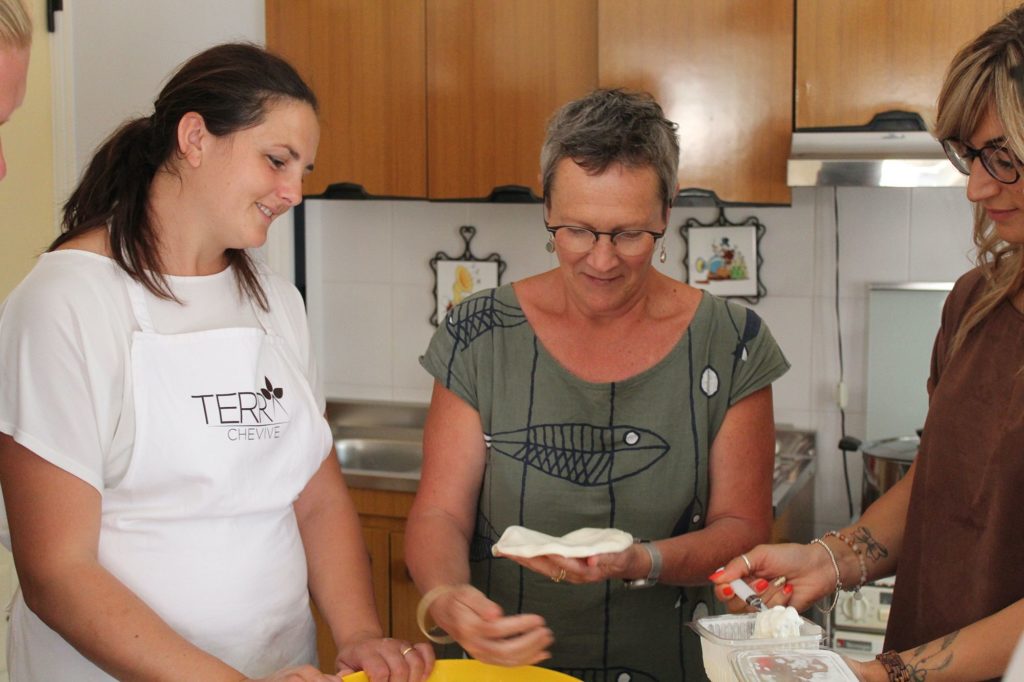
How to book your cheese experience in Puglia
Contact us by filling out the form available on this page indicating the number of participants.
Alternatively, you can send us an email to the following email address: [email protected]
We will reply as soon as possible providing you with all necessary information to make you live an unforgettable experience in Puglia.
Come and enjoy it too, we are waiting for you!
